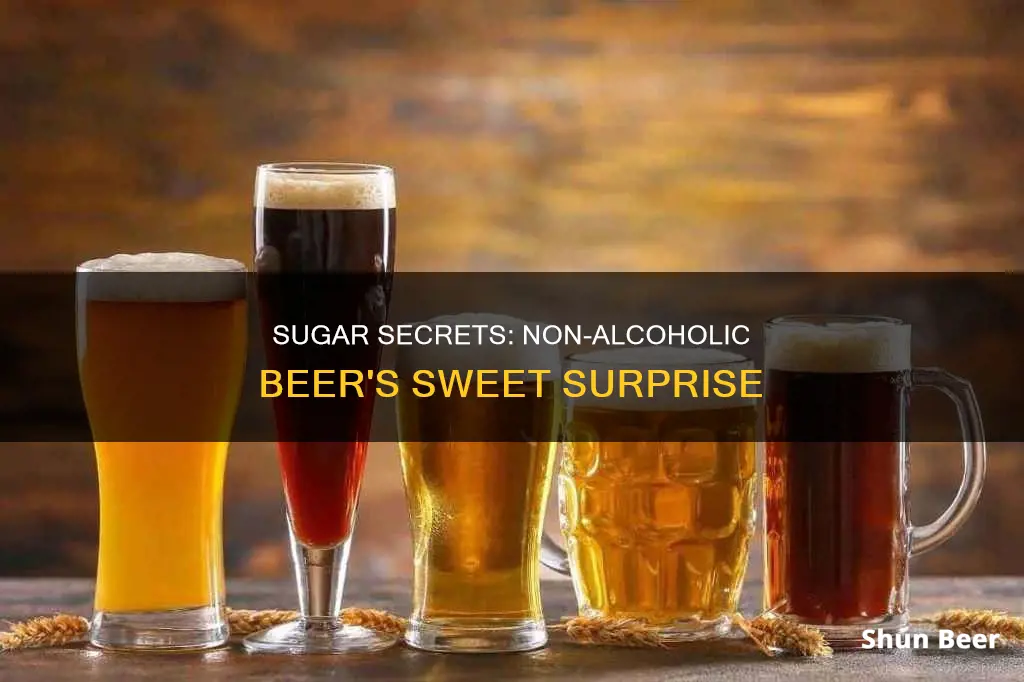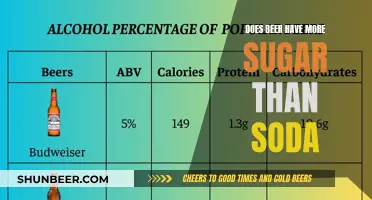
Non-alcoholic beer has become an increasingly popular alternative to alcoholic beer, with many touting its health benefits. But how does it fare in terms of sugar content?
On average, non-alcoholic beer contains around 37 calories and up to 8 grams of carbohydrates and 8 grams of sugar per 100ml. In comparison, alcoholic beer usually doesn't contain any sugar as it is converted into alcohol during the fermentation process. However, it does contain carbohydrates, which can be broken down into glucose, a type of sugar.
When it comes to specific brands, the sugar content of non-alcoholic beers varies. Heineken 0.0, for example, contains 1.3 grams of sugar per 100ml, while Budweiser Non-Alcoholic Lager contains just 0.1 grams.
While non-alcoholic beers generally have lower sugar content than soft drinks such as cola, orange juice, and tonic water, it's important to note that the sugar content can vary significantly between different brands. Therefore, checking the nutrition label is essential if you're mindful of your sugar intake.
| Characteristics | Values |
|---|---|
| Calories | Between 19 and 98 calories per serving |
| Carbohydrates | 4g of carbs per 100ml on average; up to 8g of carbs per 100ml |
| Sugar | 1.5g of sugar per 100ml on average; up to 8g of sugar per 100ml |
| Nutritional Information | Varies by brand; check the label |
What You'll Learn

Non-alcoholic beer is higher in sugar than regular beer
It's true: non-alcoholic beer typically contains more sugar than its alcoholic counterpart. This is because, during the fermentation process in alcoholic beer-making, sugar is converted into alcohol. So, while alcoholic beer may not contain any sugar, non-alcoholic beer often has sugar added to improve its taste.
Non-alcoholic beer can contain up to 8 grams of sugar per 100ml. In comparison, regular beer contains no sugar but does contain carbohydrates, which can be broken down into glucose, a type of sugar. On average, alcoholic beer contains around 3.5 grams of carbohydrates per 100ml.
Non-alcoholic beer typically contains less sugar than soft drinks such as cola, orange juice and tonic water. For example, Coca-Cola has around 10.6 grams of sugar per 100ml, while non-alcoholic beers usually have around 1.5 grams of sugar per 100ml.
Non-alcoholic beer has several benefits, including:
- It's a good alternative for people looking to reduce their alcohol intake.
- It's lower in calories than regular beer, so it can be a better option for people watching their weight.
- It often contains fewer calories than many alternative soft drinks.
- It's a more natural alternative to soft drinks, as it doesn't contain artificial sweeteners.
There are a few potential downsides to non-alcoholic beer:
- It's not a good option for people looking to reduce their calorie intake, as it often contains a similar number of calories to regular beer due to its added sugar.
- It's not suitable for pregnant women or anyone recovering from alcoholism, as it usually contains small amounts of alcohol.
- Some non-alcoholic beers contain high levels of carbohydrates, which can be converted into fat and stored in the body, leading to weight gain.
Dark Beer's Sweet Secret: More Sugar, More Flavor?
You may want to see also

Non-alcoholic beer is not always a healthier option
Non-alcoholic beer has gained popularity as a healthier alternative to regular beer. While it does have some health benefits, it is not always a healthier option, especially when it comes to sugar content.
Non-alcoholic beer is typically made by removing the alcohol from regular beer. This can be done by heating the beer or using a fine filter to strain out the alcohol. Once the alcohol is removed, the beer is flattened, and carbon dioxide is added to carbonate it. Sugar is also often added to improve the taste, which can result in a higher sugar content compared to regular beer.
Sugar content in non-alcoholic beer
Non-alcoholic beers can contain varying amounts of sugar, depending on the brand and production method. On average, they can have up to 8 grams of sugar per 100ml, which is more than twice the amount found in regular beer. This is because the sugar is added to improve the taste after the alcohol has been removed. However, it is important to note that not all non-alcoholic beers are created equal, and some may have lower sugar content.
Health considerations
While non-alcoholic beer can be a good option for people looking to reduce their alcohol intake, it may not be the best choice for those trying to lower their daily sugar or calorie intake. The added sugar in non-alcoholic beer can contribute to weight gain and increase the risk of health issues such as heart disease, cancer, and type 2 diabetes. It is also not recommended for pregnant women or individuals recovering from alcoholism, as it may still contain small amounts of alcohol.
Making an informed choice
When choosing between non-alcoholic beer and regular beer, it is important to consider your individual health needs and goals. If you are trying to reduce your alcohol intake, non-alcoholic beer can be a good option, as it has much less alcohol content. However, if you are concerned about your sugar or calorie intake, it may be better to opt for other beverage choices. Checking the nutritional information on the label can help you make an informed decision.
Beer and Blood Sugar: A Surprising Relationship
You may want to see also

Non-alcoholic beer is not suitable for pregnant women
Non-alcoholic beer typically contains up to 0.5% alcohol by volume (ABV). This means that a pregnant woman consuming non-alcoholic beer may unknowingly be exposing herself and her fetus to alcohol. Even a small amount of alcohol can have detrimental effects on the developing baby, as evidenced by the established risks associated with alcohol consumption during pregnancy. These risks include miscarriage, stillbirth, and premature birth.
Additionally, alcohol consumption during pregnancy can lead to Fetal Alcohol Spectrum Disorders (FASD), which encompass a range of physical, mental, and behavioral impairments in children. FASD can cause dysmorphic facial features, growth retardation, and serious neurodevelopmental disorders. Due to these known risks, it is generally recommended that pregnant women abstain from consuming any alcohol, including non-alcoholic beer.
Furthermore, non-alcoholic beers may contain higher-than-expected amounts of ethanol. Labels may not always accurately reflect the true ethanol content, and some beverages marketed as having 0% alcohol have been found to contain up to 1.8% ethanol. This discrepancy can be concerning for pregnant women who are trying to avoid any alcohol consumption.
While non-alcoholic beer may seem like a safer alternative to regular alcoholic beverages, it is important to understand that it still contains a small amount of alcohol. The potential risks associated with this low level of alcohol exposure during pregnancy are not fully understood due to limited research. However, given the established risks of alcohol consumption during pregnancy, it is generally recommended that pregnant women abstain from consuming non-alcoholic beer.
In conclusion, non-alcoholic beer is not suitable for pregnant women due to the presence of alcohol and the potential risks associated with its consumption during pregnancy. While the amount of alcohol in non-alcoholic beer is typically low, it can still be harmful to fetal development. To eliminate any potential risks, it is generally recommended that pregnant women abstain from consuming non-alcoholic beer and choose alcohol-free alternatives instead.
Beer and Sugar: What's the Connection?
You may want to see also

Non-alcoholic beer is not suitable for diabetics
Non-alcoholic beer is often marketed as a healthier alternative to alcoholic beer, and it's true that it has some benefits. However, it's important to remember that it's not always a healthy choice, especially for people with diabetes.
The problem with non-alcoholic beer and diabetes
The main issue with non-alcoholic beer for diabetics is its high carbohydrate and sugar content. While alcoholic beer usually doesn't contain any sugar, non-alcoholic beer often has sugar added to improve the taste. This means that non-alcoholic beer can have more than twice the carbs of regular beer, mostly in the form of sugar.
According to Diabetes UK, drinks that only contain carbohydrates, such as low-alcohol beers, are not recommended for people with diabetes. This is because the sugar in these drinks can cause a spike in blood glucose levels, which is dangerous for diabetics.
The sugar in non-alcoholic beer is a type of free sugar. These are added sugars, as well as natural sugars in food and drink (excluding milk and fruit and vegetables). The NHS recommends that adults consume no more than 30g of free sugars per day. Just one pint of non-alcoholic beer can contain almost 20g of sugar, which is the majority of the daily allowance.
Non-alcoholic beer can be a good option for people looking to reduce their alcohol intake, as it contains very little to no alcohol. It also has fewer calories than alcoholic beer, which can be beneficial for weight control. However, it's important to note that these calories are still "empty" calories, with no nutritional value.
So, is non-alcoholic beer suitable for diabetics?
In general, non-alcoholic beer is not suitable for people with diabetes due to its high carbohydrate and sugar content. These can cause spikes in blood glucose levels, which are dangerous for diabetics. While non-alcoholic beer may have some benefits, such as reduced alcohol intake and fewer calories than alcoholic beer, it's important to remember that it's not a healthy choice for everyone. It's always best to speak to a healthcare professional to get advice tailored to your individual needs.
Budweiser Beer: Sugar Content and Nutritional Facts
You may want to see also

Non-alcoholic beer is not suitable for recovering alcoholics
Non-alcoholic beer has gained popularity as an alternative for those recovering from alcohol addiction. While it contains minimal or no alcohol, typically less than 0.5% alcohol by volume (ABV), it is important to recognize that it may still pose challenges for individuals in recovery. Here are four to six paragraphs discussing why non-alcoholic beer may not be suitable for recovering alcoholics:
Firstly, non-alcoholic beer can trigger cravings and emotional associations for individuals with a history of alcohol addiction. The taste, smell, and appearance of non-alcoholic beer closely resemble those of traditional beer. This sensory stimulation can evoke powerful memories and impulses related to past drinking experiences, potentially jeopardizing an individual's sobriety. The act of consuming a beverage that resembles beer can trigger a placebo response, leading to sensations and emotions similar to those associated with alcohol consumption.
Secondly, the presence of trace amounts of alcohol in non-alcoholic beer is a concern. While the amount of alcohol is significantly lower than in regular beer, it is not always accurately represented on labels. Research suggests that some non-alcoholic beers contain higher levels of alcohol than indicated. This discrepancy can be dangerous for recovering alcoholics, as even small amounts of alcohol can be detrimental to their progress. Additionally, the consumption of non-alcoholic beer has been linked to increased levels of dopamine, a brain chemical associated with feelings of pleasure and elation, which could potentially trigger a relapse.
Thirdly, the decision to consume non-alcoholic beer during recovery should be approached with caution due to individual differences. While some recovering alcoholics may find that non-alcoholic beer helps them feel included in social situations without risking their sobriety, others may view it as a threat to their hard-earned progress. Each person must consider their unique circumstances, triggers, and motivations. For some, the pressure of social situations and the desire to fit in may outweigh the potential risks associated with non-alcoholic beer. However, for others, the mere taste or smell of beer may be enough to trigger a relapse.
Furthermore, the concept of sobriety itself is a critical consideration. Sobriety, in the context of alcohol addiction recovery, typically refers to complete abstinence from consuming alcoholic beverages. Non-alcoholic beer, despite its minimal alcohol content, may blur the lines of sobriety and create confusion or ambiguity. For some recovering alcoholics, the principle of sobriety is best upheld by avoiding any beverage that resembles or contains alcohol, regardless of the amount. Embracing sobriety often involves breaking free from the cycle of alcohol dependency, and non-alcoholic beer may not provide a clear enough distinction for some individuals.
Additionally, the potential health risks associated with non-alcoholic beer should be considered. While it may be marketed as a healthier alternative, non-alcoholic beer often contains higher levels of carbohydrates and added sugars than regular beer. These added sugars can contribute to weight gain and increase the risk of health issues such as heart disease, certain types of cancer, and type 2 diabetes. For individuals with type 1 diabetes, in particular, the high carbohydrate and sugar content of non-alcoholic beer can be dangerous. Therefore, it is crucial for recovering alcoholics to carefully evaluate the potential health implications of consuming non-alcoholic beer.
In conclusion, while non-alcoholic beer may be suitable for some individuals in recovery from alcohol addiction, it is not a one-size-fits-all solution. The decision to consume non-alcoholic beer during recovery should be made in consultation with healthcare professionals and support groups. Individual circumstances, triggers, and progress in recovery must be carefully assessed to determine if non-alcoholic beer aligns with an individual's definition of sobriety and their journey toward a healthier and happier life.
Cider Beers: Sugar Content and Health Considerations
You may want to see also
Frequently asked questions
Non-alcoholic beer typically contains between 1.5 and 8 grams of sugar per 100ml. However, the amount can vary depending on the brand and type of non-alcoholic beer. Some may contain as little as 0.1 grams of sugar per 100ml, while others may have up to 10 grams.
Non-alcoholic beer is generally considered a healthier option than regular beer, especially if you are looking to reduce your alcohol intake. It contains significantly less alcohol and has fewer calories. However, it often contains more sugar and carbohydrates, which can be a concern for people with diabetes or those trying to watch their weight.
Non-alcoholic beer typically has less sugar than soft drinks such as cola, orange juice, and tonic water. For example, a can of Coca-Cola contains 35 grams of sugar per 330ml, while a non-alcoholic beer usually has less than 10 grams of sugar per 330ml serving.
Yes, some non-alcoholic beers are specifically marketed as low-calorie and low-sugar options. For example, Heineken 0.0 and Athletic Brewing Company's Craft Non-Alcoholic Beer contain around 1.2 to 1.3 grams of sugar per 100ml, making them good choices if you're looking for lower-sugar alternatives.







